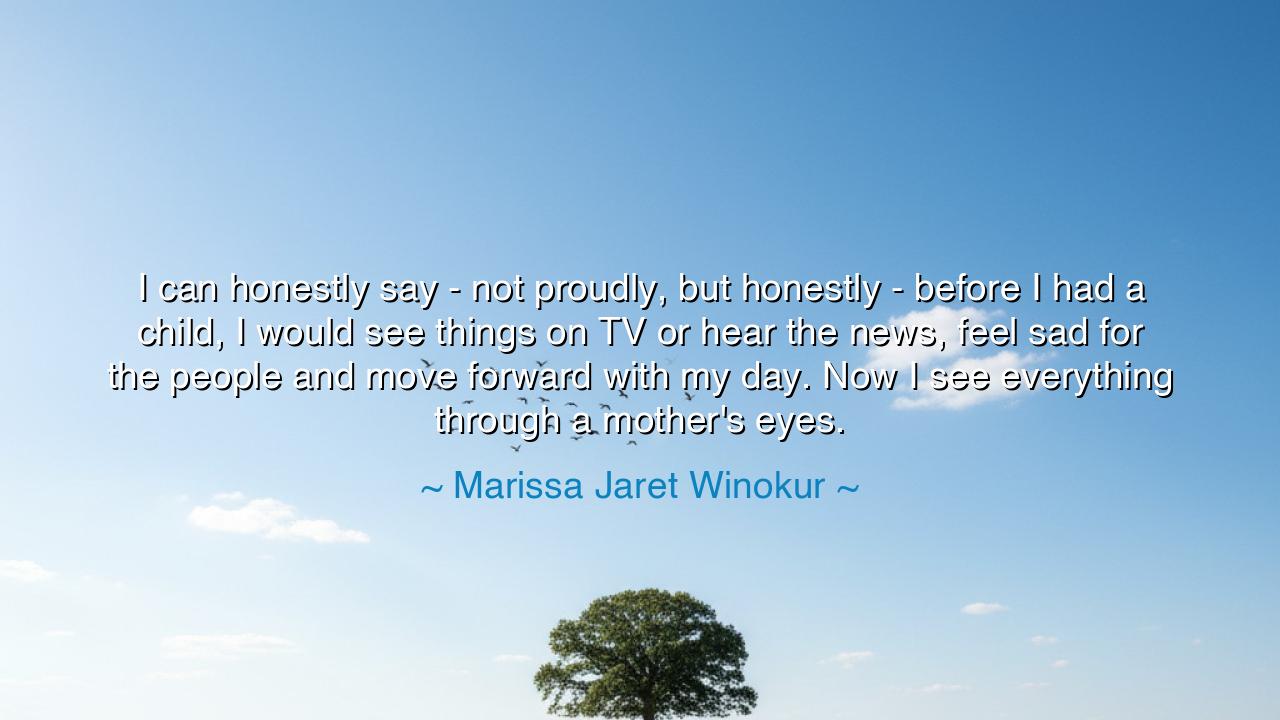
I can honestly say - not proudly, but honestly - before I had a
I can honestly say - not proudly, but honestly - before I had a child, I would see things on TV or hear the news, feel sad for the people and move forward with my day. Now I see everything through a mother's eyes.






Hear the words of Marissa Jaret Winokur, spoken with humility and the weight of transformation: “I can honestly say—not proudly, but honestly—before I had a child, I would see things on TV or hear the news, feel sad for the people and move forward with my day. Now I see everything through a mother’s eyes.” This is not merely a confession, but a revelation of how the birth of new life reshapes the soul. For motherhood—or parenthood in any form—teaches the heart to feel more deeply, to carry the sorrows of the world as if they belonged to one’s own family.
The ancients knew this change of sight. In the epics of old, queens and mothers wept not only for their own sons, but for the sons of the land. Hecuba of Troy, after losing her children in the war, became a symbol of grief for all mothers, teaching that when one child suffers, the sorrow belongs to every parent. Winokur’s words echo this timeless truth: that to see “through a mother’s eyes” is to understand the vulnerability of every human life as though it were bound to one’s own flesh and blood.
Before such transformation, the heart may feel sympathy but remain distant. One might hear of famine, of war, of tragedy, and though moved for a moment, still “move forward” with the day. But after one becomes a parent, the heart is pierced differently. Every child in danger becomes one’s own; every cry on the screen is the echo of one’s child. This is why Winokur admits she cannot look at the world the same way. The ordinary veil of detachment is torn, and the soul is awakened to the sacred weight of every life.
History offers us the story of Abraham Lincoln once more, who, after the death of his young son Willie, carried a sorrow that shaped his vision of the nation’s pain. The Civil War was no longer only a matter of politics or power—it was, to him, the loss of countless sons and daughters. His grief as a father deepened his compassion as a leader. Winokur’s confession is a gentler echo of this same transformation: that the heart which has known the fierce love of parenthood is forever changed, seeing beyond the surface into the depth of every human loss.
Yet in her humility, she confesses this change is not a matter of pride but of truth. She does not boast that she now feels more; she simply acknowledges that the bond of motherhood altered her being. There is wisdom in this honesty. It reminds us that empathy can grow, that compassion is not fixed, and that life’s milestones—such as becoming a parent—can open dimensions of the soul that were once hidden. To see through a mother’s eyes is not only to grieve more deeply, but to cherish more fiercely, to guard life with greater vigilance, and to honor the fragility of existence.
The lesson for us is clear: whether or not we are parents, we must strive to see the world through eyes of deep compassion. Do not let tragedy remain only a passing shadow in your day. Train your heart to pause, to reflect, to pray, or to act when you hear of suffering. Parenthood may awaken this vision by nature, but even those without children can cultivate the same sacred sight—choosing to treat every life as precious, every sorrow as worthy of care.
Practical action follows: when you see pain in the world—whether on the news, in your community, or in your own circle—do not simply acknowledge it and move on. Ask yourself: if this were my child, how would I respond? If this were my family, what would I do? Let that question guide you into kindness, generosity, and courage. For empathy, when practiced, becomes as transformative as motherhood itself.
Thus, Marissa Jaret Winokur’s words become more than personal reflection. They are an ancient teaching: that the heart is capable of being reborn, that love can deepen until it sees every life as kin. To look with a mother’s eyes is to live with greater tenderness, greater urgency, and greater wisdom. Let us all strive to see in this way, so that our compassion is not fleeting, but enduring—an inheritance of love for the generations to come.






AAdministratorAdministrator
Welcome, honored guests. Please leave a comment, we will respond soon